Expert Witness: June 2012
The Soul Stirrers/Swan Silvertones
Gospel for the Rest of Us
Friday, June 1, 2012
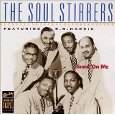 The Soul Stirrers Featuring R.H. Harris: Shine on Me (Specialty '92)
The Soul Stirrers Featuring R.H. Harris: Shine on Me (Specialty '92)
In 1991 I wrote an atheistic gospel piece called "With God on Their
Side" that I stand by. As death bears down, I may yet bend again
toward the Lord, but I doubt it, and that's not why I returned to this
1992 CD I always admired and never penetrated. It's because I sensed
in Rebert Harris a great voice that wasn't just for canary fanciers--a
voice connoisseurs of normality could learn to love. I might never be
a fan, I thought, but at least I could listen up close. Well, now I'm
a fan, and not for the usual reasons. Harris is renowned for a
falsetto he claimed incorrectly he'd invented and for an intensity
that one way or another is gospel's currency. But what distinguishes
both attractions is the restraint with which they're deployed. Yes he
took flight, yes he got gritty and sweaty. Even at his most
transported, however, he was always mellow--he always conveyed a core
spiritual calm. And his time is uncanny, adding polyrhythm to quartet
music that was always a cappella. Although a few of the lyrics have
charms even for an unbeliever--"Everybody Ought to Love Their Soul,"
"Jesus Hits Like the Atom Bomb"--they could be in Akan for all the
difference they make in the musical moment. Except, that is, for "Feel
Like My Time Ain't Long," about parents dying, which doesn't mention
the Lord once. A
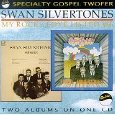 Swan Silvertones: Love Lifted Me/My Rock (Specialty '91)
Swan Silvertones: Love Lifted Me/My Rock (Specialty '91)
Especially after ace arranger Paul Owens signed on midway through
their 1951-55 Specialty stint, the Swan Silvertones relied on a
formula. But so did Motown. The problem with this one is the way it
was slicked up melodramatically just afterward, during the group's
Vee-Jay peak. The center is always Claude Jeter, direct forebear of Al
Green and a more crucial gospel falsetto than Rebert Harris
himself. But at Specialty Jeter is in a sense the straight man, and
for us secular sinners that's good. What happens around him is the
formula: the star holding steady as hard-shouting Solomon Womack and
Robert Crenshaw wild out. Anchored by drums and piano, rough sound
subsumes sweet song as the Swan Silvertones rock the
house. A MINUS
Plug/Seefeel
Heritage Post-Rock
Tuesday, June 5, 2012
 Plug: Back on Time (Ninja Tune)
Plug: Back on Time (Ninja Tune)
After I first plucked Plug from my shelves, I assumed he was some new
retro-electro guy, but actually he's minor techno legend Luke Vibert,
who I've always preferred under his Wagon Christ moniker, just not
so's I felt any need to testify about it. (Very) roughly speaking, say
Vibert is trancey, Wagon Christ fanciful, and Plug--who in the mid
'90s released the Drum'n'Bass for Papa album hard upon three
EPs, all still findable as a twofer on Trent Reznor's label--a
necromancer. Although the story is that Vibert stumbled upon 10 old
Plug tracks and declared them an album on a whim, I'm betting they
stayed in the can because they were just too all-over-the-place for
1997. But for those of us who find electronica too functional anyway,
all-over-the-place equals content: the willful structures, sonic
shifts, interrupted grooves, and goofy vocal bits are as eventful as a
good lyric. For once drum'n'bass's impossible Conlon Nancarrow beats,
which Plug does pretty well with on those EPs, are the bed where the
real music crinkles, crashes, chimes, swoops, swells, squiggles,
gurgles, cracks wise, and just generally hooks you. Start with "Come
on My Skeleton" and "Back on Time." Then do yourself a favor and
listen fore-to-aft. A MINUS
 Seefeel: Seefeel (Warp)
Seefeel: Seefeel (Warp)
The gears that never quite mesh in this disquieting but hardly
apocalyptic industrial ambient may be metal and may be plastic but are
probably both. Over steady drumming with a martial feel, they evoke
two kinds of bum transmission, one automotive and the other an AM
station breaking up on a late-night four-lane. Phones ring
occasionally. Doors squeak. Pretty people murmur and croon. But that
bird you hear chirping isn't--isn't chirping, isn't a bird. Think the
part of a Tricky album that's no way funky. Stabilized by nary a
foolish word, the unease is so unapocalyptic it's almost
comforting. B PLUS
Francis Bebey/Joan Soriano
High Hurdles
Friday, June 8, 2012
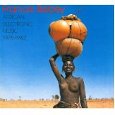 Francis Bebey: African Electronic Music 1975-1982 (Born Bad)
Francis Bebey: African Electronic Music 1975-1982 (Born Bad)
I first encountered this genial Camerounian savant via his pioneering
if romantic 1969 overview African Music: A People's Art. But
though I knew from the book jacket that he'd worked for UNESCO and
published novels, the albums that trickled my way--sanza exhibit, wan
protest songs, retrospective miscellany--seemed too schematic
musically. So I never grasped that this public intellectual was a
successful creator of singing commercials and African hits until this
conceptually cockamamy attempt to stir up the hipsterati by linking
songs notable for their jingle quotient to electronica. Created on a
primitive synthesizer in Paris, they're above all winning and catchy,
their sonics almost as quaint as thumb piano by now. Though half are
also on La Condition Masculine, which is generally deemed
Bebey's best album, this selection is hookier from the just-released
"New Track," whose subject is white starchy foods, to "The Coffee Cola
Song," whose subject is the cash economy. Dieu merci, both are
in English, which helps the French ones fit in--the instrumentals
too. And "Divorce pygmee" and "Pygmy Love Song" have it both ways,
clarifying between them the bemused respect with which this
cosmopolitan Protestant regards his native continent's profusely
musical peoples. A MINUS
 Joan Soriano: La Familia Soriano (iASO)
Joan Soriano: La Familia Soriano (iASO)
Usually I find bachata too mild--a homogenized and slightly speeded-up
MOR in which sentimental Dominican bolero slackens tensile Cuban
son. But Soriano's guitar is so nimble and articulate you forgive him
his pleasantries, and on his second U.S. album his sisters add sweet
and spicy accents to his beseeching vocals, which may deliver the
Spanish lyrics but seldom leap any language barriers. Bright, playful,
feisty, flirtatious, Nelly and Griselda are the love objects the
graceful runs and articulate phrases Joan's playing
imagines. B PLUS
Neil Young With Crazy Horse/Rhett Miller
Two American Singer-Songwriters Make Albums With Their On-and-Off Road Bands
Tuesday, June 12, 2012
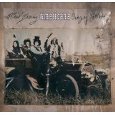 Neil Young With Crazy Horse: Americana (Reprise)
Neil Young With Crazy Horse: Americana (Reprise)
Crazy Horse yam what they yam. You don't like them, take a hike. For
all its evocation of war-dance tom-toms, Ralph Molina's thudding beat
could just as easily have inspired Young's endnote about the
civilization their namesake "detested": "the footsteps of the white
man stamped more and more across the land." In this they resemble, of
all things, the United States of America, which has been
steamrollering its own past for as long as there've been
steamrollers. In vivid contrast to the sanctimonious musicianly
overkill of Springsteen's Pete Seeger tribute, Young's overkill leads
with its middle finger by ignoring the catchiest tune of the 19th
century, the traditional melody of "Oh Susannah." But read Young's
annotations and learn that this rewrite was itself concocted 50 years
ago by forgotten folkie Tim Rose--and then wake up the next morning to
learn that it has staying power of its own. Almost every song messes
with you that way because almost every song is messed with and almost
every song renewed. "This Land Is Your Land" advocates
trespassing. "Get a Job" is accounted "a genuine folk song with all of
the true characteristics." "God Save the Queen" rhymes "politics" and
"dirty tricks." Boom, boom, boom, boom. Sha-na-na-na-na. A
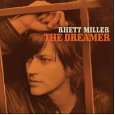 Rhett Miller: The Dreamer (Maximum Sunshine)
Rhett Miller: The Dreamer (Maximum Sunshine)
Miller fashions his excellent tunes within such a narrow melodic
compass that it always takes too long for the new ones to get sorted,
and the Nashville-trad self-production on his fourth solo album
doesn't sharpen their outlines much. But as usual the songs come clear
eventually, starting with a Ben Kweller collab bearing the aptly
ominous title "Lost Without You." It's not the winner here because the
lyric could be stronger, which cannot be said of "Complicated Man" or
"As Close as I Came to Being Right," not to mention the miserable "Out
of Love." Consider those titles. That's why I said
ominous. B PLUS
Odds and Ends 011
Been Through a Lot, These Guys
Friday, June 15, 2012
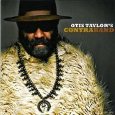 Otis Taylor: Otis Taylor's Contraband (Telarc)
Otis Taylor: Otis Taylor's Contraband (Telarc)
Colorado bluesman finally figures out how to split the difference
between gravity and taking yourself too seriously ("Yell Your Name,"
"Blind Piano Teacher") ***
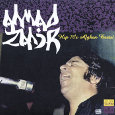 Ahmad Zahir: Hip 70s Afghan Beats! (Guerssen)
Ahmad Zahir: Hip 70s Afghan Beats! (Guerssen)
Assassinated by the Russians in 1979, Afghan rocker was too gifted
vocally and melodically to sink into schlock ("Dar Kunj Dilam Eshqi
Kasi," "Uoba Darta Rawarem") ***
Gregg Allman: Low country Blues (Rounder)
The reason the only one he wrote is called "Just Another Rider" is
that he's finally content to let better songs than his own carry him
home ("Floating Bridge," "Devil Got My Woman") **
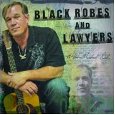 William Michael Dillon: Black Robes and Lawyers (Flying Free)
William Michael Dillon: Black Robes and Lawyers (Flying Free)
Learned a skill while doing 28 goddamn years for a murder he didn't
commit ("Black Robes and Lawyers," "Chasing a Dream") **
Stephen David Austin: A Bakersfield Dozen (StephenDavidAustin.com)
The kind of writer who remembers the day Buck Owens died, the kind of
singer who hopes someone covers his song about it ("Best Ex I Ever
Had," "The Cage") **
Waco Brothers & Paul Burch: Great Chicago Fire (Bloodshot)
Ever collegial and craving new blood, Jon L. and the gang take in a
fortysomething alt-Nashville lifer ("Great Chicago Fire," "Someone
That You Know") *
Jimmie Vaughan: Plays Blues, Ballads & Favorites (Shout! Factory)
He knows the tradition & also the difference between a traditionalist
and a remaker ("The Pleasure's All Mine," "Wheel of Fortune")
*
Jerry Lee Lewis: Mean Old Man (Verve Forecast)
The Killer's many wives etc. (those who are alive, anyway) will tell
you he's not really mean--that's just Kristofferson kidding around
("Mean Old Man," "Sweet Virginia") *
Odds and Ends 012
Been Through Less Than They Think, These Guys
Tuesday, June 19, 2012
 Diamond Rugs: Diamond Rugs (Partisan)
Diamond Rugs: Diamond Rugs (Partisan)
Whose songs do you think stick out when the Deer Tick guy convenes yet
another roots-rock supergroup with the Black Lips guy and the Dead
Confederate guy? ("Christmas in a Chinese Restaurant," "Gimme a Beer")
***
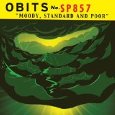 The Obits: "Moody, Standard and Poor" (Sub Pop)
The Obits: "Moody, Standard and Poor" (Sub Pop)
Perpetually PO-ed alt lifers get a grip on it ("I Want Results," "No
Fly List") ***
Wavves: Life Sux (Ghost Ramp)
"A joke a stroke of genius/Probably somewhere in between" is tuneful
enough, finally, but make that second line "Or only a waste of time?"
and we might believe he's got some brain left ("Bug," "Poor Lenore")
***
The Rapture: In the Grace of Your Love (DFA)
Posers have real lives too--really--only it's really hard to care ("In
the Grace of Your Love," "How Deep Is Your Love") ***
 Herzog: Cartoon Violence (Exit Stencil)
Herzog: Cartoon Violence (Exit Stencil)
Pop boys are always facing manhood, but that doesn't always spruce up
their songs ("Your Son Is Not a Soldier," "Fuck This Year")
**
Surfer Blood: Tarot Classics (Kanine)
EP embraces a maturity they define in part as saving your winners for
Warners ("Drinking Problem," "I'm Not Ready") **
Art Brut: Brilliant! Tragic! (The End/Cooking Vinyl)
Guitarist often shines, lyrics often don't ("Clever Clever Jazz," "Bad
Comedian") **
The Front Bottoms: The Front Bottoms (Bar/None)
Two-"man" Bergen County Nerd Liberation Front cell finish each other's
bellyaches, hire or simulate trumpet commentary ("The Beers," "Maps")
*
Azealia Banks/Rye Rye
The Sopranos
Friday, June 22, 2012
 Azealia Banks: 1991 (Interscope)
Azealia Banks: 1991 (Interscope)
Four tracks, 14 minutes of music, topped inevitably by "212" (and if
you're not among the video's 20 million hits, succumb now). All of
said songs top this eye-on-the-prize Harlemite's many other YouTube
offerings, some of which might in turn sound dandy mixed into the
mixtape and official album we are assured will soon-come. One might
bitch about the chopped-and-screwed monologue that brings total time
to 16 minutes, only it's funnier and more pointed than the Clyde Smith
skits it bites from Ghostface. So I hope this is the dancey hip-hop
Nicki Minaj's haters claim to miss and know full well it's too effing
dancey for 'em--not to mention too virtuosic, beatwise, layered,
less-is-more, and much. Quick-tongued, lascivious, catchy, and
delighted with itself, there hasn't been a more pleasurable record all
year and probably won't be--not even by her. A
 Rye Rye: Go! Pop! Bang! (Deluxe Edition) (N.E.E.T./Interscope)
Rye Rye: Go! Pop! Bang! (Deluxe Edition) (N.E.E.T./Interscope)
Always defiantly thin both sonically and conceptually, M.I.A.'s best
sidekick forever is an ideal conduit for a Bmore electro that doubles
as the sound of ingrained urban poverty--a poverty complemented by a
few throw-in anthems that use electronics to simulate affluence
instead. Finally we've reached a tipping point resembling the riot
grrrl moment of the early '90s, one in which every feisty hip-hop
soprano has a you-go-illygirl edge on her notebook-toting male
competitors. Selling point of the unfortunately download-only deluxe:
two singsongy old M.I.A. collabs that drive the point
home. B PLUS
The Rough Guide to Highlife/Electric Highlife
Highlife as Pop and Not
Tuesday, June 26, 2012
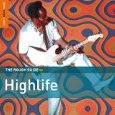 The Rough Guide to Highlife (World Music Network)
The Rough Guide to Highlife (World Music Network)
Although the label's second pass at this expandable concept tends
quirkier and quieter, in-house compiler Rachel Jackson goes for the
gut tunewise. From the surprising pre-Afrobeat Fela who opens to the
gospel falsetto-as-girl group who close, every song stands out, so
much so that Jackson really could have risked Celestine Ukwu's
"Osundu" rather than repeating the oft-compiled "Igede." Special
faves: the Black Beats' "Tsutsu Tsonemo" for hook, Gentleman Bobby
Benson's "Taxi Driver" for lyric, Francis Kenya's "Memia" for guitar
compression, and Chief Stephen Osita Osadebe's "Osondi Owendi" for
guitar expansion. There's a slight tailoff before the gospel closer,
but not so as to spoil your appetite for the bonus disc by the
university-based trio Seprewa Kasa. On Riverboat four years ago, I
found their preservationism a mite polite. Here the same album
provides a graceful, restful, informative coda. A
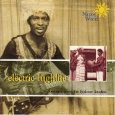 Electric Highlife: Sessions From the Bokoor Studios (Naxos World '02)
Electric Highlife: Sessions From the Bokoor Studios (Naxos World '02)
Ghanaian-Nigerian highlife was a pop music not just because it was
urban and popular, but because it produced something resembling hits
and stars--in their world, the Victors Uwaifo and Olaiya were
genuinely famous. Not these eight early-'80s guitar bands John Collins
recorded in Accra. As all too part-time musicians in a ruined economy,
they share a likably ramshackle feel, which infused by the good cheer
they mustered in the face of 100 percent inflation is enough to sell
this collection. But I noticed a funny thing when I looked closely at
the second Rough Guide to Highlife, which is that its two
finest tracks began their public life at Bokoor: the hummable one by
the Black Beats, who had a long if varied career elsewhere, and the
musicianly one by Francis Kenya, who seems to have been Collins's
greatest protege. Think there were some players over in Ghana? Must
have been. A MINUS
A Place to Bury Strangers
What? Sex? Can't You Hear Sex?!
Friday, June 29, 2012
 A Place to Bury Strangers: Worship (Dead Oceans)
A Place to Bury Strangers: Worship (Dead Oceans)
With Oliver Ackermann a guitar effects tycoon first and a bandleader
second, I hear them as an electronica outfit whose inhuman beat
happens to be all volumized hard-rock boom-boom, only less funky than
that stuff can get with sentient humans leaking flesh and blood on the
tubs. What few words you can make out have the rare virtue of
straightforwardness and are less miserabilist than you might
fear--compelling sex in make-her-scream mode can cheer up a fella
whose political-existential irrelevance is getting him down. But the
album's logic is musical--even, plausibly, sexual. Beginning with a
lyric whose faint eroticism is buried by the two-word theme statement
"all alone," it works up to a provisional climax, tails to a lament
followed by a dirge, and then explodes into overdrive: "Why I Can't
Cry Anymore," Goth dread at its sanest and most desperate, followed by
the breakneck rancor of "Revenge," presumably directed at the departed
screamer. Lyrically, a dumb sequence--at least the two could have been
reversed. Sonically, it's dynamite. A MINUS
 A Place to Bury Strangers: Onwards to the Wall (Dead Oceans)
A Place to Bury Strangers: Onwards to the Wall (Dead Oceans)
The placeholder EP is blunter and slighter than the album, two pieces
of echoey roar fore and aft flanking a title song whose surprising
"I'm still in love with you" is enunciated credibly and of all things
breathily by--of all things--a goil. Alanna Nuala of Moon, to be
precise. You know--Moon. Actually, neither do
I. A MINUS
MSN Music, June 2012
| May 2012 | July 2012 |
 RSS
RSS